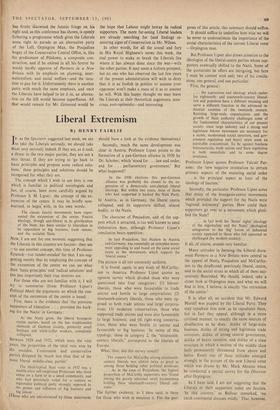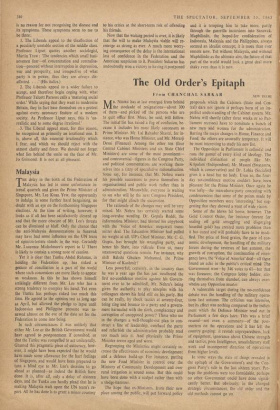Liberal Extremism
By HENRY FAIRLIE IF, as the Spectator suggested last week, we are to take the Liberals seriously, we should take them very seriously indeed. If they are, as it said, a threat to the two major parties, they are not a nice threat. If they are trying to `go back to basic principles and propose some radical solu- tions,' these principles and solutions should be recognised for what they are.
The concept which I wish to use here is one which is familiar to political sociologists and has, of course, been most carefully argued by Professor S. M. Lipset: the concept of the ex- tremism of the centre. It may be briefly sum- marised, to begin with, in his own words: The classic fascist movements have repre- sented the extremism of the centre. Fascist ideology, though anti-liberal in its glorification of the State, has been similar to liberalism in its opposition to big business, trade unions, and the socialist State.
Now, I am not for one moment suggesting that the Liberals in this country 'are fascists: they are -to use another concept, this time of Professor Eysenck—too `tender-minded' for that. I am sug- gesting merely that by employing the concept of the extremism of the centre we can see what their 'basic principles' and `radical solutions' and (no less important) their true motives are.
For those who are not familiar with it, I will try to summarise (from Professor Lipset's Political Man) the arguments on which the con- cept of the extremism of the centre is based.
First, there is the evidence that 'the previous supporters of liberalism . : . provided the back- ing for the Nazis' in Germany :
As the Nazis grew, the liberal bourgeois centre parties, based on the less traditionalist elements of German society, primarily small business and white-collar workers, completely collapsed.
Between 1928 and 1932, which were the vital years, the proportion of the total vote won by the socialist, Communist and conservative parties dropped by 'much less than that of the more liberal middle-class parties.'
The ideal-typical Nazi voter in 1932 was a middle-class self-employed Protestant who lived either on a farm or in a small community, and who had previously voted for a centrist or regionalist political party strongly opposed to the power and influence of big business and big labour.
(Those who are unconvinced by•these statements should have a look at the evidence themselves.) Secondly, much the same development was clear in Austria. Professor Lipset points to the formation of a pan-German alliance in 1930 by Dr. Schober, which 'stood for . . . law and order, and for . . . parliamentary government.' But what happened?
In the 1930 elections this pan-German alliance was probably the closest to the ex- pression of a democratic anti-clerical liberal ideology. But within two years, most of those who had supported it backed the Nazi Party.
In Austria, as in Germany, the liberal centre collapsed, and its supporters shifted, almost bodily, to the Nazis.
The character of Poujadism, and of the sup- port which it attracted, is too well known to need elaboration here, although Professor Lipset's conclusion bears repetition: In fact• Poujadism, like Nazism in Austria and Germany, was essentially an extremist move- ment appealing to and based on the same social strata as the movements which support the 'liberal centre' The picture is all too ominously uniform.
It Is found, again, in any study of McCarthy- ism in America. Professor Lipset quotes an opinion survey which divided those who were questioned into four categories: (1) labour- liberals, those who were favourable to trade unions and hostile to large corporations; (2) nineteenth-century liberals, those who were op- posed to both trade unions and large corpora- tions; (3) moderate conservatives, those who supported trade unions and were also favourable to large business; and (4) right-wing conserva- tives, those who were hostile to unions and favourable to big business. 'In terms of this typology, those in category the "nineteenth- century liberals," correspond to the liberals of Europe.'
What, then, did this survey reveal?
The support for McCarthy among nineteenth- century liberals was almost twice as great as among those holding other political positions. . . . As in the case of Poujadism, the highest proportion of McCarthy supporters was 'found among The poorly educated small businessmen holding these nineteenth-century liberal atti- tudes.'
The further evidence, as I have said, is there for those who wish to examine it. For the pur- poses of this article, this summary should suffice.
It should suffice to underline how wise we will be never to underestimate the importance of the social characteristics of the current Liberal voter —Orpington man.
But Professor Lipset also draws attention to the ideologies of the liberal-centre parties whose sup- porters eventually shifted to the Nazis. Some of the quotations he offers are intriguing, but here I must be content with only two of his conclu- sions, one general, and one particular.
First, the general: . . . the aspirations and ideology which under- lay eighteenth- and nineteenth-century liberal- ism and populism have a different meaning and serve a different function in the advanced in- dustrial societies of the twentieth century. Resisting large-scale organisations and the growth of State authority challenges some of the fundamental characteristics of our present society, since large industry and a strong and legitimate labour movement are necessary for a stable, modernised social structure, and gov- ernment regulation and heavy taxes seem an inevitable concomitant. To be against business bureaucracies, trade unions and State regulation is both unrealistic and to some degree irrational.
Professor Lipset quotes Professor Talcott Par- sons: the 'new negative orientation to certain primary aspects of the maturing social order . . . is the principal aspect at least of the ideology of fascism.'
Secondly, the particular. Professor Lipset notes that many of the bourgeois-centre movements which provided the support for the Nazis were `regional autonomy' parties. How could their supporters go over to a movement which glori- fied the State?
. . . in fact both the 'States' rights' ideology of the regionalists and the Nazis' ideological antagonism to the 'big' forces of industrial society appealed to those who felt uprooted or challenged [by modern society].
tt all, of course, sounds very familiar.
Many attitudes in forming the Liberal docu- ment Partners in a New Britain were central to the appeal of Nazis, Poujadism and McCarthy- ism to the, disaffected, previously liberal, centre, and to the social strata in which all of them suc- cessively flourished. We should, indeed, take a closer look at Orpington man, and what we will find in him, I believe, is exactly 'the extremism of the centre.'
It is, after all, no accident that Mr. Edward Martell was pupped by the Liberal Party. They may repudiate him now, as he repudiates them, but in fact they appeal, although in a more civilised manner, to exactly the same sources of disaffection as he does: dislike of large-scale business, dislike of strong and legitimate trade unionism, dislike of strong central government, dislike of heavy taxation, and dislike of a class structure in which a section of the middle class feels permanently threatened from above and below. Every one of these attitudes emerged strongly in the picture of the new Liberal voter which was drawn by Mr. Mark Abrams when he conducted a special survey for the Observer after Orpington.
As I have said, I am not suggesting that the Liberals or their supporters today are fascists. 'In this country,' as Balfour remarked, 'we catch continental diseases mildly.' That, however. is no reason for not recognising the disease and its symptoms. These symptoms seem to me to be three: 1. The Liberals appeal to the disaffection of a peculiarly unstable section of the middle class. Professor Lipset quotes another sociologist, Martin Trow: 'The tendencies Which small busi- nessmen fear—of concentration and centralisa- tion—proceed without interruption in depression, war and prosperity, and irrespective of what party is in power; thus they are always dis- affected. . . (His italics.) 2. The Liberals appeal to a wider failure to accept, and therefore begin coping with, what Professor Talcott Parsons calls a 'maturing social order.' While saying that they want to modernise Britain, they in fact base themselves on a protest against every necessary feature of a modern society. As Professor Lipset says, this is `un- realistic and to some degree irrational.'
3. The Liberal appeal must, for this reason, be recognised as primarily an irrational one. It is, above all, this essential irrationality which fear, and which we should reject with the utmost clarity and force. We should not forget what lies behind the smile on the face of Mr. Jo Grimond. It is not at all pleasant.
Malaysia
Tim delay in the birth of the Federation of Malaysia has led to some unfortunate in- ternal quarrels and given the Prime Minister of Singapore, Mr. Lee Kuan Yew, the opportunity to indulge in some further hard bargaining, no doubt with an eye on the forthcoming Singapore elections. At the time of writing, however, it looks as if all has been satisfactorily cleared up and that the more obscure of Mr. Lee's threats can be dismissed as bluff. Only the chance that the anti-Malaysia demonstrations in Sarawak may have had some influence on the UN team of opinion-testers stands in the way. Certainly Mr. Laurence Michehnore's report to U Thant is likely to contain a strong note of caution.
Yet it is clear that Tunku Abdul Rahman, in holding the Federation up, has risked a gesture of conciliation in a part of the world where such concessions are more likely to appear as weakness. In this he has shown himself strikingly different from Mr. Lee who has a strong tendency to overplay his hand. Yet even the Tunku has perhaps risked too much this time. He agreed to the opinion test as long ago as April, but allowed the pledge to lapse until Indonesian and Philippine pressure was re- newed almost on the eve of the date set for the Federation to come into being.
In such circumstances it was unlikely that either Mr. Lee or the British Government would have agreed to postponement if consulted, so that the Tunku was compelled to act unilaterally. Granted this pragmatic piece of autocracy, how- ever, it might have been expected that he would have made some allowance for the hurt feelings of Singapore, and would have been prepared to turn a blind eye to Mr. Lee's decision to go ahead as pIanned—as indeed the British have done. It is, after all, only a delay of sixteeen days, and the Tunku can hardly plead that he is making Malaysia wait upon the UN team's re- port. All he has done is to grant a minor courtesy to his critics at the short-term risk of offending his friends. Now that the waiting period is over, it-is likely that the will to make Malaysia viable will re- emerge as strong as ever. A much more worry- ing consequence of the delay is the international loss of confidence in the Federation and the American scepticism to it. President Sukarno has undoubtedly won a victory in having it postponed and it is tempting him to take more, partly through the guerrilla incursions into Sarawak. Maphilindo, the hoped-for confederation of Indonesia, Malaysia and the Philippines, always seemed an idealist concept; it is more than ever remote now. Yet without Malaysia, and without Maphilindo as the ultimate aim, the future of that part of the world would look a great deal more shaky even than it is now.































 Previous page
Previous page